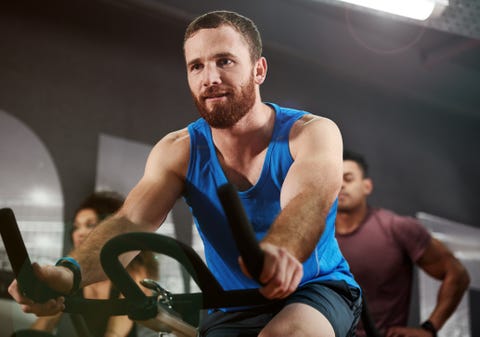You know that high-intensity interval training (HIIT) is great for your body. Not only does incorporating HIIT workouts into your routine help boost your running speed and power, but it has also been shown to help you lose weight and protect your heart, too.
Here’s one more to add to the list: HIIT may be able to curb your appetite, too. According to a new study published in the journal Experimental Physiology, HIIT—especially when done later in the day as opposed to in the morning—can also quell your cravings when it comes to food.
The small study out of Charles Sturt University in Australia included 11 middle-aged men whose peak oxygen consumption (VO2peak) and sleeping and eating patterns were recorded a week before any experimental testing was done. Afterwards, they participated in three trials of 30 minutes of high-intensity interval exercise (HIIE), which involved six one-minute high-intensity cycling sprints at 100 percent of their VO2peak with four minutes of rest at 50 percent of their VO2peak in between each sprint.
Each trial lasted three days each—the first was done in the morning, the second was done in the afternoon, and the third was done in the evening. There were five days of recovery between each trial.

MikoletteGetty Images
The results? Participants’ levels of the appetite-stimulating hormone ghrelin were actually reduced in the afternoon and evening trials.
One reason may be because peak power output was slightly higher during the afternoon and evening sprints than in the morning. The researchers believe that greater power output leads to a greater reduction in the signals governing your appetite.
Additionally, among the workout times, there were no significant differences in the total sleep duration of the participants or how well they slept. Translation: Those who sweated at night didn’t sleep any worse. So the age-old adage to avoid exercise—especially at a high intensity—in the hours before going to sleep might not be true.
In fact, the researchers believe that HIIT may actually help you sleep, since it triggers a larger release of the stress hormone norepinephrine, lead author Penelope Larsen, Ph.D.(c) of Charles Sturt University’s School of Exercise Science, Sport, and Health told Runner’s World. That’s important, since it may aid in non-REM sleep—or deep sleep—and delay REM sleep, where your breathing becomes faster and irregular, and your heart rate and blood pressure increase to levels that are similar to when you’re awake. As a result, you’ll feel more well rested.
However, Larsen noted that while the evening portion of the experiment was done between 6 p.m. and 8 p.m., “the ‘ideal’ time [to work out] before bed would be different for everybody,” since no one’s body reacts exactly the same. Depending on your sleep-wake cycle, the best time for you may be slightly earlier or later. Just make sure your workout is not encroaching on your normal bedtime, so that you continue to get the same amount of sleep as you always do.
Another important note: Because study participants were exclusively middle-aged men, it’s hard for Larsen and her colleagues to say for sure whether or not other populations would respond the same way to evening HIIT.
“Previous research has shown that for young adults (predominantly men), evening high-intensity exercise can also be performed safely without detriment to subsequent sleep,” she said. “However, given hormonal changes experienced throughout the monthly cycle by women of a similar age group, or young adult women, sleep responses may be different to the findings of the current study.”
From: Runner’s World US
Source: Read Full Article
